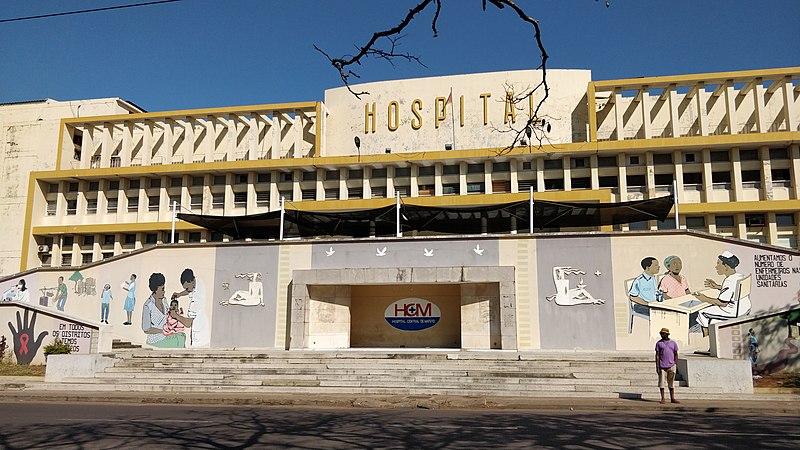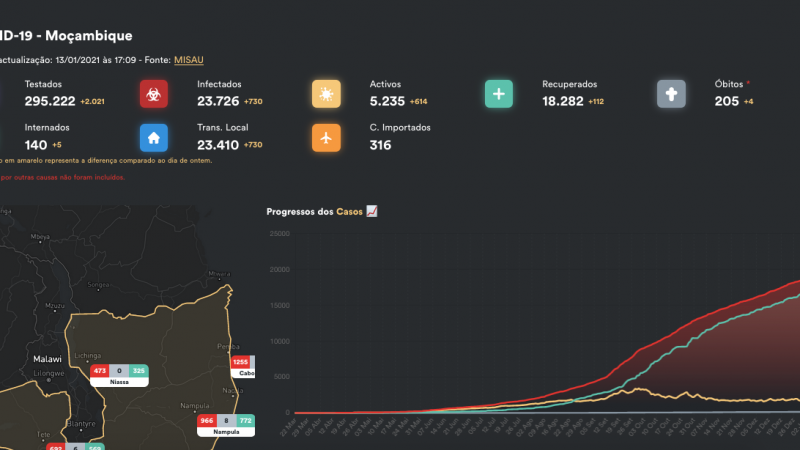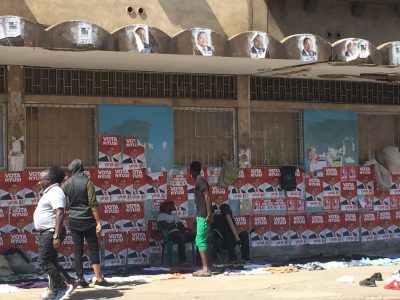
Central Hospital of Maputo, Mozambique, July 14, 2018. Photo by Jcornelius via Wikimedia Commons, CC BY-SA 4.0.
Like several other African countries, Mozambique declared a state of emergency to control the spread of the coronavirus in March last year, and has extended it three times due to increased COVID-19 cases.
Since mid-December, cases have increased in Mozambique. As of January 19, there are more than 27,446 cases and 249 dead, according to Johns Hopkins University. Hospitals are about 90 percent occupied in the public sector and private hospital beds are fully occupied.
Essentially, since September 2020, citizens must follow several restrictive measures that limit the circulation of people and goods, according to the state-of-emergency decree.
To ensure the rapid flow of critical, accurate public health information during this time, several digital platforms have emerged in the private and public sector.
However, these platforms and initiatives lack clarity in terms of how they work and what their potential impact may have on data privacy and personal security.
Information management, privacy and security
A platform called Fica Atento, created by the National Institute of Health (INS) was designed to disseminate official information about the pandemic in Mozambique. Another platform called CovidMoz intends to share real-time data about COVID-19 in the country.
Fica Atento is not mandatory, but as a state-sponsored entity, it appears to be the most highly recommended for COVID-19 information, whereas CovidMoz is a new, private initiative.
By the third quarter of 2020,Fica Atento reports more than 80,000 users, while CovidMoz reports more than 50,000 users. However, neither company could provide Global Voices with the latest user registration data.

Screenshot of CovidMoz application, January 13, 2021.
For Luís Pereira, and Clayton Matule, Covidmoz creators, security issues should be highlighted across all internet apps, including their own. In an interview with Global Voices, they said users should assume all apps are tracking and collecting user data, and encourage applications to provide a feedback loop for users.
They insist, however, that Covidmz does not store its users’ data except for emails used to send quick alerts with optional daily updates. The opt-out quality respects users’ freedom to choose, they say.
However, they co-creators admit they are unsure if their platform currently guarantees user security and privacy. Additionally, Mozambique has no data security law, although a law does exist on electronic transactions.
Matule told Global Voices:
We are not right [about its current privacy settings] but we are here to find solutions and help, because we all want to support, and it makes no sense to violate people's privacy to make money. … We have to have a bit of ethics and empathy to respect who accesses our platform, but let's be honest, nobody reads the terms and conditions…
It is still unclear, however, what the company will do with user emails when the pandemic ends. When Global Voices visited the platform, we did not find any terms and conditions on the site.
In addition to apps, the government took several other measures to collect citizen data in the name of fighting COVID-19.
In March last year, the government introduced a GPS monitoring and tracking system for all travelers entering Mozambique via airports and borders, stating in Article 3 of the emergency decree that all police and health authorities “should create the necessary conditions to locate, in real time, by geographical location” anyone who came into direct contact with COVID-19.
The system was later discontinued without explanation and there is no information about where or how that user data was stored or destroyed.
Staff and residents with the Ministry of Health conduct contact-tracing efforts by asking citizens who may have been in contact with the virus to provide their mobile phone number and home contact, which is then stored and shared with government health professionals.
Coronavirus narratives in digital spaces
In an interview with Global Voices, Mussa Chaleque, from the INS, said that institutional communication concerned him because there was a lot of “fake news” circulating about the coronavirus and citizens were largely in the dark about COVID-19 in Mozambique.
In February last year, before the first case, Mozambican authorities warned against misinformation about COVID-19, with a statement from the Maputo Central Hospital (HCM):
“Any information on the evolution of coronavirus in the country will be reported promptly through the usual communication channels.”
A month later, a Mozambican newspaper called CanalMoz reported the first COVID-19 cases, but these were never confirmed by the Ministry of Health.
The INS also published several tweets attempting to dispel various myths circulating online about the coronavirus.
In this tweet, they inform the public that the virus can not be spread through sexual contact:
Até ao momento, não está comprovado que o sémen ou o suor possam transmitir a #COVID19. No entanto, a infecção pelo coronavírus pode acontecer durante os actos sexuais, através dos beijos ou da proximidade entre as pessoas, pois o vírus transmite-se pelas gotículas de saliva. pic.twitter.com/uNkI1Ed7IW
— Instituto Nacional de Saúde (INS) (@instituto_ins) May 5, 2020
To date, it has not been proven that semen or sweat can transmit #COVID19. However, infection with the coronavirus can happen during sexual acts, through kissing or proximity between people, as the virus is transmitted by droplets of saliva.
In another tweet, they caution that antibiotics fight bacteria, not viruses:
Os antibióticos combatem as bactérias e não os vírus. Como tal, eles não servem para prevenir ou tratar o novo coronavírus. No entanto, os antibióticos podem ser usados no tratamento de outra infecção que um doente com COVID-19 possa ter. #Covid19Moz #FicaAtento pic.twitter.com/BK465SvrgW
— Instituto Nacional de Saúde (INS) (@instituto_ins) May 17, 2020
Antibiotics fight bacteria, not viruses. As such, they do not serve to prevent or treat the new coronavirus. However, antibiotics can be used to treat another infection that a COVID-19 patient may have.
In this tweet, they dispelled the myth that sun exposure could help kill the coronavirus:
Apanhar sol é importante para produzir vitamina D e fortalecer o sistema imunitário, mas não o impede de contrair a #COVID19. Para evitar a infecção pelo novo coronavírus lave várias vezes as mãos com água e sabão, mantenha a distância de 1,5 metros das restantes pessoas. pic.twitter.com/ngY9aBejtt— Instituto Nacional de Saúde (INS) (@instituto_ins) May 13, 2020
Staying in the sun is important to produce vitamin D and strengthen the immune system, but it does not prevent you from contracting #COVID19. To avoid infection with the new coronavirus wash your hands several times with soap and water, keep a distance of 1.5 meters from other people.
In December 2020, the Media Institute of Southern Africa created a platform called MisaCheck, dedicated to fact-checking news in Mozambican media. Their aim is to expose and report on false information on matters of national interest in Mozambican media. Its first fact-checking project focused on COVID-19 denial by Mozambican citizens.
Chaleque told Global Voices that during a virtual dialogue on misinformation in digital spaces in June 2020, organized in Tunisia, by the African Centers for Disease Control, many people had asked if information circulating on social media came from the Ministry of Health, or not.
To answer this question, we created a digital platform called PENSA. Thus, the creation of the platform was the first initiative, and our inspiration was South Africa.
PENSA’s mHealth platform provides every Mozambican free, government-approved health information through USSD, SMS, and a responsive website.
The PENSA platform, available on all Mozambican mobile network operators by dialing *660# — or through the website — allows citizens to “see symptoms, precautions and general information for various diseases; see information on maternal health, baby development, and vaccines; get contact details for health facilities; and more.”
PENSA's public health mission is to disseminate the most accurate information as widely as possible, working with the Ministry of Health to make the health content freely accessible by the masses.
There are only slight differences between PENSA, with the Ministry of Health, and Fica Atento, with the INS.
Chaleque said he can not comment much on security and privacy issues, because the INS does not conduct too much data collection. They do, however, provide a field for people to ask questions and answers via email on their site, without collecting email addresses, Chaleque said.
However, he admits that personal data may be gathered through the “chatbot” application, where the INS use the WhatsApp platform to send messages to users about COVID-19. He tells Global Voices that so far, Fica Atento users have exceeded 80,000.
Despite the existence of a vague legal framework for these various measures through the state of emergency decree, it remains unclear how citizens’ digital security and privacy are protected during this period.
This article is part of a series of posts examining interference with digital rights under lockdowns and beyond during the COVID-19 pandemic in nine African countries: Uganda, Zimbabwe, Mozambique, Algeria, Nigeria, Namibia, Tunisia, Tanzania and Ethiopia. The project is funded by the Africa Digital Rights Fund of The Collaboration on International ICT Policy for East and Southern Africa (CIPESA).



